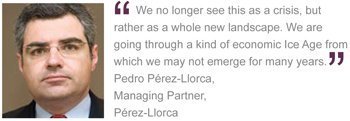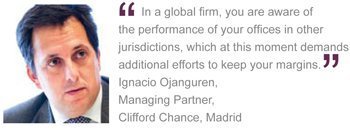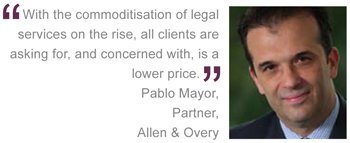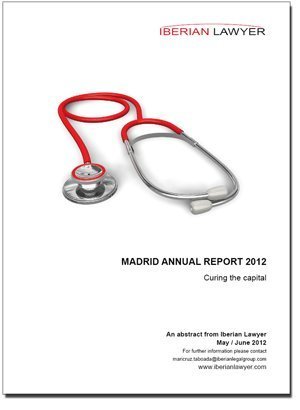Madrid Annual Report 2012: Curing the capital
Spain is dominating the headlines for all the wrong reasons, most recently a banking sector bailout. Madrid, with its potential to generate wealth and attract investment, has to be the driving force for recovery. What the future holds is anyone’s guess, but what is certain is that the current crisis is most definitely a game changer.
España está últimamente en los titulares de toda la prensa internacional aunque por malas noticias, siendo lo más sonado el rescate de la banca. Madrid se prevé como foco económico conductor de la recuperación española gracias a su capacidad de generar riqueza y atraer inversión. En el informe anual sobre el Mercado Jurídico en Madrid los abogados afirman que lo único que tienen claro es que el mercado se está transformando y aún veremos más cambios.
The very recent, and very publicised, bailout of Spain´s banking sector has so far done little to restore confidence in the market. With the much needed financial injection into the banking sector, even Prime Minister Rajoy acknowledged a bad year lay ahead. What the future holds is currently anyone’s guess, but what is certain is that the current crisis is most definitely a game changer.
“We no longer see this as a crisis, but rather as a whole new landscape,” says Pedro Pérez-Llorca, Managing Partner at Pérez-Llorca. “We are going through a kind of economic Ice Age from which we may not emerge for many years.”
As Spain’s capital city, Madrid, however, has the advantage, and privilege, of housing its Government, public administrations and financial institutions. The down side is that when things go wrong, catastrophically in this case, then the blame lands firmly at the city’s feet – fairly or unfairly, the capital is intrinsically linked to the rest of the country. Madrid, however, is doing a better job of defending itself than other regions in Spain, say lawyers.
Capital benefits
Since Spain’s economy peaked in 2007/2008, things have been getting worse year-on-year, acknowledges Fernando Torrente, Partner at Cuatrecasas, Gonçalves Pereira in Madrid, “but Madrid’s economy has, so far, performed better than the rest of Spain”.
Being the capital city has its advantages. It attracts talent looking for opportunities that no other region in Spain can offer, and its infrastructure, laws and regulations favour economic and business activities, which generates confidence among investors. And this has a direct impact on its ability to attract foreign investment, something the country sorely needs. 
Madrid can clearly offer more resources and a better infrastructure than other cities, and is most likely the first port of call for most investors looking to come into Spain. Nowadays, the city offers facilities for entrepreneurs, says Ignacio Legido, Partner at BDO Abogados in Madrid and Barcelona, where business development, as well as the possibility of being closer to financial entities and to the main corporations of the country, come first.
For Juan Ferré, Managing Partner of the Spanish offices of PLUTA, the German insolvency specialist, the opportunities lie in the fact that the major financial, political and economic players have their headquarters in Madrid.
However, the economy of the Community of Madrid and the city itself have, throughout history, followed the same cycles as the Spanish economy, explains Manuel Martín, Managing Partner at Gómez-Acebo & Pombo. When the national economy shows growth, that is reflected in the accounts of the Community of Madrid and vice versa. Therefore with Spain currently showing negative growth, Madrid’s advantages may not, however, be enough to weather this particular storm. This is also compounded by a serious lack of credit fluidity, that, says Antonio Cañadas, Partner at Roca Junyent in Madrid, “is no longer a worry, but a stark reality”.
“This is a crisis unlike any other, and in Spain we haven’t yet been exposed to all its elements,” says José Luis Huerta, Managing Partner at Hogan Lovells in Madrid. “The UK and US markets, for example, are very different to ours – at least there you are seeing some movement and signs of recovery.”
This comparison to other jurisdictions is something that is clearly a sore point for Spain, especially as the eyes of the world are resting on its fate. “If we are to compete with other countries,” says Pérez-Llorca at Pérez-Llorca, “we need to change our economy as theirs are already more productive than ours”.
Legislate to recuperate
The Spanish Government seems to be the key to helping the country’s economy emerge from the mess it is currently in. And the way in which Spain manages the crisis, is unfortunately tied into how the Government legislates, says Iñaki Gabilondo, Managing Partner of Freshfields Bruckhaus Deringer in Spain. And legislate they have.
The urgent reforms they have been pushing through over the past year cover many essential aspects of Spain´s infrastructure, including an overhaul of its financial system and reform of its labour and tax regulations. And there is an upside to this for law firms, as it will probably generate a great deal of work during the coming months, which for Javier Ybañez, Partner at Garrigues in Madrid, “presents opportunities for law firms like us”.
The reforms have received mostly positive reviews from lawyers, who perceive them as steps in the right direction with the potential to gain the confidence of the financial markets, reduce the unemployment and promote economic growth.
There is also, however, a feeling among lawyers that the Government is acting in an improvised and reactive way.
“Every Friday something seems to change,” explains Luis Briones, Managing Partner of Baker & McKenzie in Madrid. Having not implemented reforms for around 12 years, it is as if the Government are now trying to carry out as many reforms as they can at the same time.
While no short-term effects are anticipated, other than strengthening the confidence in the solvency of Spain and its financial entities, says Rafael Montejo, Managing Partner at Osborne Clarke in Madrid, the feeling is that the positive effects are only likely in the mid to long-term.
The longer-term view is therefore more positive, particularly in relation to the creation of more jobs and regaining credibility within the international market, in which Spain has lost so much ground over the past year, says José María de Lorenzo, Managing Partner at Irwin Mitchell in Spain.
But to really get the economy going, what Spain needs is a strong banking sector again and to get rid of its hellish real estate problems – something that will require the Government to find even more imaginative solutions to pull Spain out of the crisis.
A ‘buyers’ market
Imagination is something the legal market has had little of. Historically, it has had a very limited vision when it comes to planning for the future, according to Ignacio Ojanguren, Managing Partner at Clifford Chance in Spain, and the crisis has only served to highlight its lack of foresight.
So while Spain has been on the decline, the legal market has followed suit. It has significantly decreased over the past few years, says Legido at BDO Abogados, explaining this to be because of the low level of business activity and the economic asphyxia that Spanish companies are suffering.
Law firms that previously had offices in seven or eight locations throughout Spain are now only in two or three at most – but always in Madrid, adds Pablo Mayor, Partner at Allen & Overy. “They are no longer interested in more regional locations, something that will have a big impact on Spain in the long-term.”
In Madrid specifically, the feeling among lawyers is that there are clearly more opportunities than elsewhere in Spain. “All the ‘big cases´ end up sooner or later in Madrid, assuming they were not born in Madrid,” says Julio Veloso, Partner at Broseta Abogados in Madrid, “and the capital is more active (or not as weak and depressed) than the rest of the country.” This does, however, mean greater and tougher competition in the legal sector.

The number of bids for work has multiplied since the crisis, and law firms are seeing a major increase in competition between themselves. Additionally, new players in the market are coming to compete with the established firms in certain areas, says Ojanguren at Clifford Chance, and in many cases being able to do so at lower prices.
According to Israel Gómez-Caro, Partner at GOLD Abogados in Madrid, larger firms will likely need to form alliances and mergers to maintain a dominant position in the market. This is something that could prove very fruitful as, given the challenging times, certain medium and smaller firms are more receptive to mergers or new alliances.
The overall consensus among lawyers is that the legal market has radically changed. “It’s a buyer’s market,” says Juan Jiménez-Laiglesia , Co-Managing Partner at DLA Piper Spain. But the agents of change have been the clients, he explains, and this time the change is permanent. “What shocks us most isn’t the change itself, but how quickly it took place, which makes it very difficult to prepare a solid strategy.”
Strategy in a storm
Forward planning in the current environment is no easy task. With the level of uncertainty around, and the goal posts moving at such an alarming rate, today´s strategy could be tomorrow’s new problems to address. However, strategic thinking and planning do not have to be set in stone; they can be adapted and adjusted and reviewed, says Serena Argente Escartín at Raposo Bernardo in Madrid. In fact most firms have been and are continuing to review and revise strategies on an almost weekly basis, with cutting headcount and fees being the implied, but not admitted, result.
The main challenge at the moment, according to Martín at Gómez-Acebo & Pombo, is to maintain profitability during the crisis at a reasonable level. The key for a redefinition of any strategy, adds Rafael Alonso, Managing Partner at Squire Sanders in Spain, is to be focused on helping in the development of your client’s expansion plans and management.
Firms are therefore having to adapt to the current circumstances of their clients while keeping up their profitability and many are doing so by lowering their internal costs to counterbalance a decrease in revenue. Firms are keeping a close eye on their internal structures and the remuneration of their lawyers, in particular, and leaving for later those activities that are not absolutely essential, for example, opening new offices abroad says Francisco G. Prol, Partner at Prol y Asociados in Madrid.
Spanish firms with international offices, lawyers say, have the benefit of the revenue abroad to offset the decrease in domestic activity. However, this does have a downside. “In a global firm, you are aware of the performance of your offices in other jurisdictions, which at this moment demands additional efforts to keep your margins,” says Ojanguren at Clifford Chance. “Offices in other jurisdictions are having good levels of activity and having very good results, which only puts additional pressure on us here in Madrid.”
Strategies are also leaning towards adjusting to a wider practice area focus. Firms with a strong multi-disciplinary element will be in a better position to meet the challenges of the economic crisis head-on, adds Álvaro Sainz, Senior Partner at Herbert Smith Spain. “Investment across several practice areas and, therefore, the multi-disciplinary element of firms will dilute the risks they face, with some practice areas offsetting the potential lower activity of others.”
Assisting clients with their own risk management has moved up the to-do list as “preventing risk is a value-add that is setting law firms apart from their competitors”, says Gabilondo at Freshfields. And ensuring their services fall under the heading of ‘a value-add’ and not just ‘commoditised’ is a high priority, say lawyers. For Luis Fernando Guerra, Managing Partner at Deloitte Abogados y Asesores Tributarios, the challenge is knowing not to just offer one distinct advantage, but several differences with higher added value over other competitors.

Shift in activity
Firms are, however, beginning to plan in a more realistic and current way. For Pérez-Llorca, “with our three main areas of work – corporate, litigation/regulatory and tax/employment, we don’t think about when they are going to recover to pre-crisis standards, but rather about growing them at the price and demand levels that the market offers at the moment.”
And the market is currently very demanding in specific sectors, in particular, say lawyers, in insolvency and restructuring – which comes as no great surprise. This has increased considerably, explains Javier Vasserot, Managing Partner at Olswang Spain, but so has employment advice on collective dismissal procedures and collective suspension of employment contracts – a welcome factor arising from the recent labour reforms, lawyers agree. And legislative reforms are, and will continue, to generate a considerable amount of work as businesses are in need of advice on how to keep up.
There are fewer M&A opportunities, as investors are far more cautious than before. While there is money to spend, they are afraid of putting it on the table, says Juan Francisco Falcón, Partner at Uría Menéndez in Madrid, and there continues to be a value gap in the perception of potential sellers and potential buyers.
However, lawyers agree that interest from foreign investors in Spanish distressed assets is on the rise, with some hinting that it is only distressed assets that businesses are being told to target. In fact, say lawyers, law firms are talking to clients ouside of the country to win new foreign distressed investment work and target alternative capital providers.
Show me the money
Spanish law firms are dealing with fewer and lower-volume transactions and a more competitive and mature market, according to Federico Roig, Partner at Cuatrecasas, Gonçalves Pereira in Madrid, on top of which clients have restricted budgets, meaning that there is, and will continue to be, increased fee pressure.
With the commoditisation of legal services on the rise, all clients are asking for, and concerned about, is a lower price, says Mayor at Allen & Overy, which seems to be the consensus across the board. “Clients are asking me where we charge less,” adds Jiménez-Laiglesia at DLA Piper Spain, “and whether we can apply those discounts to all areas”.
The number of companies calling for firms to tender and pitch for work is increasing and the pressure on fees is becoming more and more aggressive, say lawyers. “Fortunately, we have had enough work to be able to refuse very ‘aggressive’ engagements on fees,” says Alejandro Fernández De Araoz, Partner at Araoz & Rueda in Madrid. “We have indeed lost work because we were not ready to lower fees, but we do not regret it. The fees quoted by some firms show how much they needed the work to ‘keep the wheel turning’.”
The danger here is of course that lowering fees and treating services as commodities means that once the crisis has (hopefully) passed, these services cannot revert back to value-add, lawyers agree.
“As lawyers, we need to be advocates of the value of our services and our value-add,” warns Falcón at Uría Menéndez. “If we drop our fees unreasonably then we will be contributing to the impression that the value of our work isn’t important.”
Specialisation, lawyers say, is key to ensuring clients are aware of the level of value-add. The legal market tends to a higher degree of specialisation, says Gonzalo Stampa, Partner at arbitration boutique Stampa Abogados, a characteristic for which the client will pay.
Companies are also rationalising the cost of having external advisers, according to Legido at BDO Abogados, which leads them to be much more demanding regarding the type of firm, the professionals, the services and the fees they are prepared to accept.
Clients in crisis
In difficult times, lawyers themselves need to be wary, and pay very close attention to the working capital and carefully scrutinise the solvency of their clients. When clients are having financial difficulties, explains Fernández De Araoz at Araoz & Rueda, they tend to squeeze fees and postpone payments to service providers because in these times, ‘cash is king’ more than ever.
With clients facing more difficulties when trying to obtain finance and finding it harder to keep growing, they have been forced to reduce their costs, including legal, says Vasserot at Olswang Spain. “They are therefore no longer thinking of legal services provided by firms as a ‘service’, but rather as an ‘expense’ that must be reduced.”
Therefore lawyers are noticing that companies are rethinking the structure of in-house legal departments and keeping more legal work internally. Clients used to have a different law firm in each jurisdiction, says Briones at Baker & McKenzie. “Now, their panels of lawyers are much smaller, therefore competition among law firms is fierce.”
Clients are also becoming even more demanding of the services their external law firms provide. They no longer require only legal expertise from their advisers, according to Roig at Cuatrecasas, Gonçalves Pereira, but also expect a knowledge of their business sector and to advise them according to the circumstances of each sector and the corresponding risks.
For Montejo at Osborne Clarke, this adds to an already incredibly competitive market, and only those firms that are clearly focused on understanding their clients´ businesses will succeed in this critical environment.
Looking to the future
There is a lack of realism in Spain’s economy, and it is getting a huge reality check, says Jiménez-Laiglesia at DLA Piper Spain. “What was before, isn’t here anymore. But what is to come, hasn’t arrived yet.”
It is precisely this uncertainty that is making it so difficult to do business. There are investors out there who could inject much needed capital into the market, say lawyers, but the uncertainty is holding them back. To gain certainty, investment is needed to jump start the economy, so there is a catch-22 scenario that is keeping everyone on edge.
People are not only economically exhausted but also physically exhausted, explains Veloso at Broseta Abogados. “After four years, we need positive thinking and hope as much as we need financial and economic recovery.”
Among lawyers, however, there is still a level of optimism. “There are lots of opportunities if you really look for them, and there is work apart from M&A transactions,” says Ybañez at Garrigues. “We should realise that we are privileged as a profession in comparison to others, so we should take advantage of the situation and change what the crisis has shown needs to be changed.”
Lawyers must fully adapt to reality, helping clients to perform in the toughest conditions and seeking opportunities, according to Torrente at Cuatrecasas, Gonçalves Pereira. “We will need to capitalise and adapt, something the legal market has the capacity to do, particularly in Spain where competition among law firms has been really tough over the past decades.”
However, with a strong capacity to attract investment initiatives from both institutional and private investors, Madrid is still the financial hub of Spain, says Hugo Écija, Managing Partner at Ecija.
Nobody knows exactly what is going to happen, as the fate of the Euro and the Eurozone still hang in the balance. But Madrid, with its potential to generate wealth and attract investment, its affinity with the Government and with its own economical policy, has to be the driving force for recovery.
Whether the bailout will be enough to kick start the process only time will tell. At this point in time, Spain is taking its medicine, says de Lorenzo at Irwin Mitchell Abogados. But it may take a while before we see any positive effects.












